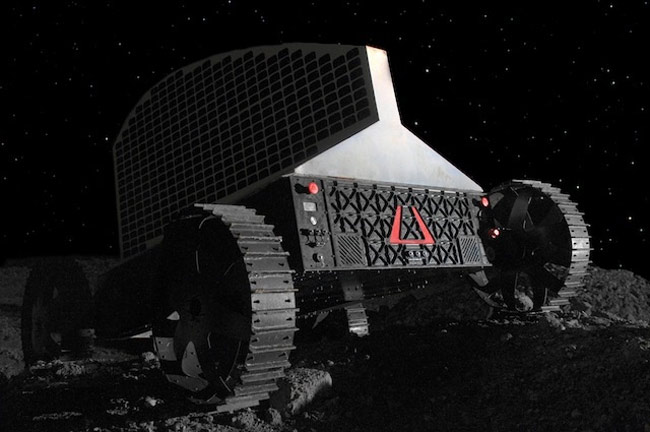Google Lunar X Prize Robot Built to Find Lunar Water

The search for water ice on the moon could be led someday by a robot armed with a 4-foot drill. With the first prototype of the lunar rover, called Polaris, comes the prospect of eventually extracting resources from the moon, asteroids or other planets through space mining.
Polaris is the robot of choice for Astrobotic Technology, one of many private teams competing for the $30 million Google Lunar X Prize for landing robotic explorers on the moon. But Astrobotic also wants to build a lasting business out of its lunar exploration efforts by testing the technologies needed for space mining.
"This rover is a first step toward using off-Earth resources to further human exploration of our solar system," said John Thornton, president of the Pittsburgh-based robotics company, which unveiled the prototype Oct. 8.
Polaris is the size of a golf cart and tall enough to wield a 4-foot drill. It can move a foot per second on its 2-foot-wide wheels and carry 150 pounds (70 kilograms) of drilling equipment and science instruments. Between its heavy drill and batteries and its lightweight wheels and chassis, the robot weighs about 330 pounds (150 kilograms).
Polaris will need to withstand frigid temperatures as low as minus 280 degrees Fahrenheit (minus 173 Celsius).
The lunar rover's power comes from solar panels designed to point toward the sun as it peeks just above the moon's south pole.
A lack of GPS on the moon required a workaround. Astrobotic hit upon the clever idea of having the rover match whatever it sees on the surface with pictures of satellite images taken by NASA's Lunar Reconnaissance Orbiter.
Breaking space news, the latest updates on rocket launches, skywatching events and more!
If Polaris reaches the moon, it could be perhaps the first of many robots that scout sites for space mining operations. NASA has already begun talking with about putting its own ice-prospecting instruments on the private rover — one of nine contracts worth $3.6 million that the U.S. space agency has awarded to Astrobotic.
This story was provided by TechNewsDaily, sister site to SPACE.com. Follow TechNewsDaily on Twitter @TechNewsDaily, or on Facebook.
Join our Space Forums to keep talking space on the latest missions, night sky and more! And if you have a news tip, correction or comment, let us know at: community@space.com.
TechNewsDaily was an online daily news publication founded by Purch dedicated to covering the latest news, discoveries and innovations in technology. The site launched in 2010 and ran through 2014.


